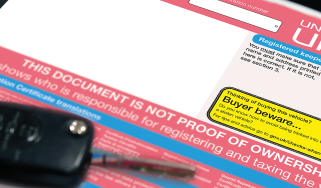Mis-sold car finance scandal: could you be due compensation?
Did you buy a car on finance between April 2007 and January 2021? You could be owed thousands!

Don’t worry, Auto Express isn’t about to join the bandwagon of claims-management firms advertising on social media and elsewhere, using well-known statements to get their claws into a share of any payout you – and millions of others – may one day be entitled to as a result of a ‘mis-sold’ car finance agreement.
At issue are finance agreements including a non-disclosed Discretionary Commission Agreement between your lender and your dealer, allowing the latter to secretly tweak interest rates for more or less commission. DCAs were banned in 2021, but were commonplace before that, especially in the franchised/prime used-car sector.
Complainants say that dealers raising rates behind customers’ backs to earn extra commission was an unfair practice. They want customers to be compensated for any additional interest paid out, a view backed by two recent decisions by the Financial Ombudsman, which sided with a pair of complainants demanding just that.
When you look at the numbers, it’s no surprise that so many claims-management firms want a slice of a future compensation pie. Around £40billion is lent on car finance every year in the UK and, after financial advice website Money Saving Expert launched its free finance-reclaim tool in early February, it reported users had submitted more than a million complaints in a little over a month. That means car buyers have been staking claims for possible compensation at a rate of 30,000 per day on that site alone.
For a business such as Money Saving Expert that relies on website clicks for income, that’s as good as money in the bank. But it’s a nightmare for lenders, who are being forced to deal with an avalanche of ‘on spec’ claims from punters excited by the hype of what’s being described as ‘the next PPI scandal’.
Some pundits have predicted that UK banks could be walloped with payouts totalling £16billion, but last month major UK lender Lloyds earmarked £450million as its potential payout pot, a lot less than the £2billion hit some had predicted for the bank. Barclays and Santander are among other high-street names exposed to potential claims, while specialist motors lender Close Brothers’ stock has fallen dramatically on fears of compensation bills.
But for all the hype about big payouts over the horizon, we’re still six months away from a verdict from the industry regulator – the Financial Conduct Authority (FCA). It will determine whether meaningful harm has been caused on a systemic level to customers, whether a national compensation scheme is warranted, and even what proportion of any payouts lenders or dealers might be liable for.
“We are using our powers to review historical motor-finance commission arrangements and sales across several firms,” the FCA said in January, when launching its inquiry. “If we find there has been widespread misconduct and that consumers have lost out, we will identify how best to make sure people who are owed compensation receive an appropriate settlement in an orderly and efficient way and, if necessary, resolve any contested legal issues of general importance.”
With so much uncertainty, is the frenzy around finance compensation justified, or is talk of big payouts just pie in the sky?
Discretionary Commission Arrangements
DCAs meant dealers, in effect acting as brokers for finance companies, were able to discreetly jack up or reduce the rate of interest – thereby altering customers’ monthly finance charges – to either boost their commission or sweeten the deal for customers.
Which would have been fine, if only those dealers had been more transparent about the nature of the deals they were putting together. But in 2019 the FCA mystery-shopped car retailers to find out how dealers were explaining their commission deals.
Shockingly (or unsurprisingly, depending on your point of view), the FCA found only a tiny proportion of dealers were talking to customers about their commissions for arranging finance; only one in 37 franchised dealers levelled with their customers, while four in 60 independent retailers did so, and two out of 14 car supermarkets.
As a result of its 2019 report, and with the support of the finance industry, in 2021 the FCA banned discretionary commission models. But the FCA’s mystery-shopping exercise provided an indication of the extraordinarily high numbers of customers who had previously signed up to finance agreements potentially unaware of their dealers’ ‘side hustle’ on interest rates.
Coupled with the impact of the ombudsman’s two recent rulings over non-disclosed DCAs, many pundits subsequently expect the FCA to compel finance companies to roll out standard procedures for swiftly compensating millions of others. That’s why the claims-management industry, flush with an estimated £5billion in fees from the £40billion or so paid out in compensation by high-street banks over the Payment Protection Insurance (PPI) scandal, smells blood in the water.
How big might any compensation payouts be?
It depends on who you listen to. On the one hand there are claims-management firms who, pending the arrival of the UK-wide compensation scheme they’re hopeful the FCA will announce, are focusing heavily on acquiring ‘victims’ of commission non-disclosure.
Entering into a contract with one of these companies is likely to mean you’ll be obliged to hand over up to 30 per cent of your compensation, should there be any, so naturally they’re inclined to promote the notion of big payoutsin the hope you’ll be tempted to sign up.
The FCA’s own figures, drawn from its 2019 investigation, suggest that buyers with a DCA element in their finance deal paid an average of £1,100 more on a typical four-year cash loan of £10,000. However, as yet the FCA has given no indication of which customers – if any – might expect all, some or none of that extra cash back. Here’s why...
DCAs: They weren’t all bad
According to Adrian Dally, director of motor finance at the Finance & Leasing Association (FLA), those speculating that car finance compensation will be ‘the new PPI’ scandal are way off the mark. “You’ll get some commentators saying ‘my agreement had a DCA, therefore it was unfair and I’m entitled to compensation’,” he says. “Not true. Where dealers had discretionary commission arrangements, the rates went down far more often than they went up. We would expect the FCA to find that customer outcomes have been very good.”
There were basically two types of DCA in play until 2019. One which started with a maximum interest rate that a dealer could reduce with a commensurate reduction in commission earnings, and another which started with the lowest possible interest rate and paid more commission as the dealer jacked the rate up.
Either way, the FLA argument runs that you need to consider all the elements of a transaction as pieces of a larger jigsaw. Even when rates were pushed up to boost commission, it says, that typically meant dealers were able to offer a better trade-in valuation, or a bigger discount on the asking price of the car for sale – with the customer paying less overall.
“The FCA is an outcome-based regulator. So it’s looking at whether there was harm caused to customers, and was that harm caused by a breach of the rules,” says Dally. “That’s the diagnostic work the FCA is doing. Looking at what the interest rates were, what was the commission received, and what other benefits did the consumer get from car-price reductions, trade-in improvements, or extras added if a higher interest rate was sold.”
So although a non-disclosure of commission arrangements may have been a technical breach of the regulations, it’s not fair to say that customers as a whole suffered any overall loss, the lenders argue. Whether it’s an argument that holds water with the FCA is, quite literally, a multi-million dollar question.
What should you do if you’ve bought a car on finance?
Arguably nothing – at least until the FCA compels the lending industry to put a compensation scheme in place. By holding fire, you’re not sharing data with third- party websites or worse, contracting yourself to sharing a sizeable chunk of any future payout with a claims- management firm that’s taking an early punt on the FCA’s verdict.
If the thought of doing nothing even at this early stage is simply too much to bear, you can join in the fun at MoneySavingExpert.com. Use its online tool to simply ask lenders which – if any – of your finance deals since 2007 included a Discretionary Compensation Agreement, and to simultaneously lodge a complaint.
Alternatively you can write to your lender in person, to ask whether any of your finance deals included DCAs. Just remember that nothing you can do now is likely to affect your ability to claim compensation when the FCA judgement arrives.
Click here for our guide on how to buy a car online...
Find a car with the experts








